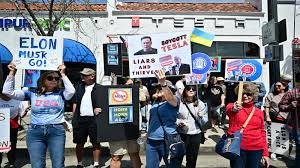In recent weeks, a series of global protests have emerged targeting Tesla, Inc. and its CEO, Elon Musk. Demonstrators are expressing opposition to Musk’s political involvement, particularly his role as head of the Department of Government Efficiency (DOGE) under President Donald Trump, which has led to significant federal agency cuts. These protests, collectively referred to as the “Tesla Takedown,” aim to impact Musk economically by encouraging the boycott of Tesla products and the sale of Tesla stock.
Global Day of Action
On March 29, 2025, a coordinated “Global Day of Action” took place, with protests occurring at Tesla dealerships across the United States and in cities worldwide, including Berlin, Paris, London, and Dublin. In San Francisco, hundreds gathered outside a Tesla showroom, chanting slogans and voicing concerns over Musk’s influence in government. Similar demonstrations were reported in New York City, Washington, Vancouver, and various European capitals.
Demographic Involvement
Notably, the protests have attracted a diverse demographic. In Michigan, for instance, approximately 400 protesters, primarily retirees over the age of 65, assembled outside a Tesla showroom in Ann Arbor. Participants expressed fears about threats to democracy and the influence of billionaires in politics.
Incidents and Responses
While the majority of protests have been peaceful, there have been reports of vandalism and violence. Some Tesla vehicles have been vandalized, and instances of clashes between protesters and counterprotesters have occurred. Organizers have condemned these acts, emphasizing the importance of nonviolent demonstration.
Impact on Tesla
The protests have coincided with a decline in Tesla’s stock value, with a reported 31% decrease year-to-date. Investor confidence appears shaken, and resale values of Tesla vehicles have also dropped. Employees have expressed concern over the company’s direction amidst Musk’s political entanglements.
Organizational Support
The movement has garnered support from various organizations and public figures. The youth-led climate group Planet Over Profit co-sponsored the San Francisco protest, highlighting environmental concerns alongside political issues. State Senator Scott Wiener also voiced support, emphasizing the strategic importance of the protests.
Conclusion
The “Tesla Takedown” movement reflects growing public dissent regarding Elon Musk’s political activities and their perceived impact on democratic institutions. As protests continue globally, the movement underscores the complex intersection of corporate influence and political power in contemporary society.





